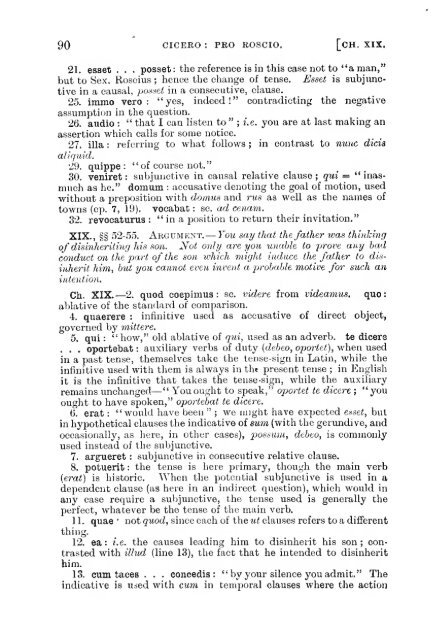Pro S. Roscio Amerino
Pro S. Roscio Amerino
Pro S. Roscio Amerino
Create successful ePaper yourself
Turn your PDF publications into a flip-book with our unique Google optimized e-Paper software.
90 CICERO : PRO ROSCIO. [CH. XIX.<br />
21. esset . . . posset : the referenee is in this case not to "a man,"<br />
but to Sex. Roscius ; hence the change of tense. Esset is subjiinotive<br />
in a causal, posset in a consecutive, clause.<br />
25. immo vero : "yes, indeed!" contradieting the negative<br />
assuniption in the question.<br />
26. audio : " that I can listen to" ; i.e. you are at last making an<br />
assertion which calls for some notice.<br />
27. illa : referring to what follows ; in contrast to nunc dicia<br />
aliquid.<br />
29. quippe : "of course not."<br />
30. veniret : subjunctive in eausal relative clause qui = " inas-<br />
;<br />
much as he. " domum : aceusative denoting the goal of motion, used<br />
without a preposition with domus and rus as well as the names of<br />
towns (cp. 7, 19). vocabat : sc. ad cenam.<br />
32. revocaturus " : in a position to return their invitation."<br />
XIX., §§ 52-55. Argument.— You say that thefather was thinJcing<br />
of disinheriting his son. Not only are you unable to prove any had<br />
conduct cm, the part of the son tvhich might induce the father to disinherit<br />
him, but you cannot even invent a probable motive for such an<br />
intention.<br />
Ch. XIX.—2. quod coepimus : sc. videre from videamus. quo:<br />
ablative of the standard of coniparison.<br />
4. quaerere : infinitive used as aceusative of direct object,<br />
governed by mittere.<br />
5. qui : " liow," old ablative of qui, used as an adverb. te dicere<br />
. . . oportebat : auxiliary verbs of duty (debeo, oportet), when used<br />
in a past tense, themselves take the tense-sign in Latin, while the<br />
infinitive used with them is always in thr present tense ; in English<br />
it is the infinitive that takes the tense-sign, while the auxiliary<br />
remains unchanged— " You ought to speak," oportet te dicere ; "you<br />
ought to have spoken," aportebat te dicere.<br />
6. erat : " would have been " ; we luight have expected esset, but<br />
in hypothetical clauses the indicative of 8um (with the gerundive, and<br />
occasionally, as here, in other cases), possum, debeo, is commouly<br />
used instead of the subjunctive.<br />
7. argueret : subjunctive in consecutive relative clause.<br />
8. potuerit : the tense is here primary, though the main verb<br />
(erat) is historic. When the potential subjunctive is used in a<br />
dependent clause (as here in an indirect question), which would in<br />
any case require a subjunctive, the tense used is generally the<br />
perfect, whatever be the tense of the main verb.<br />
11. quae not quod, since each of the xd clauses refers to a different<br />
thing.<br />
12. ea : i.e. the causes leading him to disinherit his son ; eontrasted<br />
with illud (line 13), the fact that he intended to disinherit<br />
him.<br />
your silence youadmit." The<br />
13. ctim taces . . . concedis : "by<br />
indicative is Used with cwm iu temporal clauses where the action

















